January 12, 2008
THE PRESIDENT: Good morning. I just had a really good meeting with Ambassador Crocker, General Petraeus, Secretary Rice, members of my National Security team. We discussed the situation in Iraq; we discussed the progress that's being made, the challenges that lie ahead, and we discussed the fact that what happens in Iraq impacts everything else in this vital region.
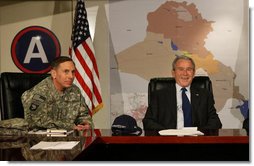 I really appreciate you all coming over, but more importantly, I appreciate your service to the country.
I really appreciate you all coming over, but more importantly, I appreciate your service to the country.
One year ago, I addressed the American people to announce a new way forward in Iraq. At that time, Iraq was riven by sectarian violence. The violence had increased over the course of 2006, and it threatened the collapse1 of the political process. Economic activity was languishing2. Al Qaeda was strengthening its grip in critical parts of Iraq, including parts of the capital city of Baghdad. Shia extremist groups, some with the backing from Iran, were increasing their attacks on coalition3 and Iraqi forces.
Our strategy simply wasn't working. And the world was watching. Our friends and foes4 had the same question: Would we turn our back on our friends and allow Iraq to descend5 into chaos6? Or would we change our approach, and stand with the Iraqi people and help them take back their country from the terrorists and extremists?
We chose to support our Iraqi partners; we chose to help them protect the Iraqi people from the terrorists and radicals7. The new way forward I announced one year ago changed our approach in fundamental ways. We sent more combat troops to Iraq. We refocused their mission to protecting the Iraqi people, and to fighting the enemy in the strongholds and denying sanctuary8 anywhere in the country. We began a diplomatic surge to cut off the networks of foreign fighters that were flowing into Iraq from Syria, and to cut the support of Shia extremists coming from Iran, and to encourage the region to give more support to the Iraqi government. We surged civilians10 into Iraq to support our military efforts, doubling the number of provincial11 reconstruction12 teams, and facilitating Iraqi political reconciliation13 from the bottom up.
I nominated General Petraeus and Ambassador Crocker to carry out this new strategy. This was a tough assignment for them. And they -- and all the good men and women they're privileged to lead -- are doing an outstanding job.
Iraq is now a different place from one year ago. Much hard work remains14, but levels of violence are significantly reduced. Hope is returning to Baghdad, and hope is returning to towns and villages throughout the country. Iraqis who fled the violence are beginning to return and rebuild their lives. Al Qaeda remains dangerous, and it will continue to target the innocent with violence. But we've dealt al Qaeda in Iraq heavy blows, and it now faces a growing uprising of ordinary Iraqis who want to live peaceful lives. Extremist militias16 remain a concern. But they, too, have been disrupted, and moderates are turning on those who espouse17 violence. Iran's role in fomenting18 violence has been exposed; Iranian agents are in our custody19, and we are learning more about how Iran has supported extremist groups with training and lethal20 aid.
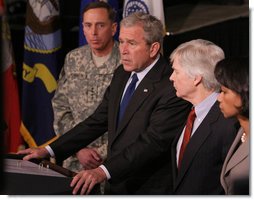 Iraqis are gradually take [sic] control of their country. Over the past year, Iraqi forces conducted a surge of their own, generating well over 100,000 more Iraqi police and soldiers to sustain the security gains. Tens of thousands of concerned local citizens are protecting their communities, and working with coalition and Iraqi forces to ensure al Qaeda cannot return. The Iraqi government is distributing oil revenues across the country, so that reconstruction can follow hard-won security gains. And from Kirkuk to Ramadi, to Karbala to Bagdad, the people of Iraq -- Sunni, Shia, and Kurd -- are coming together at the grass roots to build a common future.
Iraqis are gradually take [sic] control of their country. Over the past year, Iraqi forces conducted a surge of their own, generating well over 100,000 more Iraqi police and soldiers to sustain the security gains. Tens of thousands of concerned local citizens are protecting their communities, and working with coalition and Iraqi forces to ensure al Qaeda cannot return. The Iraqi government is distributing oil revenues across the country, so that reconstruction can follow hard-won security gains. And from Kirkuk to Ramadi, to Karbala to Bagdad, the people of Iraq -- Sunni, Shia, and Kurd -- are coming together at the grass roots to build a common future.
These improvements are allowing some U.S. forces to return home -- a return on success that has now begun. One Army brigade and one Marine21 Expeditionary Unit have already come home, and they will not be replaced. In the coming months, four additional brigades and two Marine battalions23 will follow suit. Any additional reduction will be based on the recommendation of General Petraeus, and those recommendations will be based entirely24 on the conditions on the ground in Iraq.
The months ahead offer prospects25 for further progress. Iraq's local leaders need to continue to improve conditions from the bottom up. And Iraq's national leaders need to follow up on the successful adoption26 of the pension reform by passing a revised de-Baathification law and a national budget. And the linkages27 between the local and national levels must be strengthened and expanded. Iraqi security forces need to continue to grow and improve and take the fight to al Qaeda and other extremist groups. Criminals need to be defeated in Iraqi neighborhoods. Syria needs to further reduce the flow of terrorists to the territory, especially suicide bombers28. Iran must stop supporting the militia15 special groups that attack Iraqi and coalition forces, and kidnap and kill Iraqi officials.
The international community must remain engaged -- including through the third expanded ministerial meeting on Iraq, which will take place right here in Kuwait. I had the honor last night of telling His Highness how much we appreciated the fact that Kuwait has taken the lead in hosting these meetings.
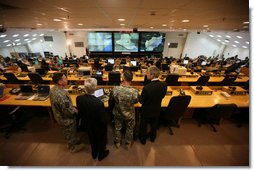 We cannot take the achievements of 2007 for granted. We must do all we can to ensure that 2008 brings even greater progress for Iraq's young democracy.
We cannot take the achievements of 2007 for granted. We must do all we can to ensure that 2008 brings even greater progress for Iraq's young democracy.
America is going to do our part. Long-term success in Iraq is vital to our friends here in the region -- and to America's national security. And long-term success will require active U.S. engagement that outlasts29 my presidency30. So at the invitation of Iraqi leaders, we're now building an enduring relationship with Iraq. This relationship will have diplomatic, economic, and security components31 -- similar to relationships we have with Kuwait and other nations in this region and around the world. Most important, in a place where Saddam Hussein once menaced the world, the new U.S.-Iraqi relationship will strengthen a democracy that serves its people, fights terrorists, and serves as a beacon32 of freedom for millions across the Middle East.
Ambassador Crocker and General Petraeus will continue to carry out our policy in Iraq -- and they need to get back to Baghdad. So I better stop talking. I want to thank them for your service. I want you to thank your families for how much I appreciate your sacrifices. I also want to thank the soldiers, sailors, airmen, Marines, and Coast Guardsmen, as well as the diplomats33, intelligence officers, civilian9 employees, and contractors34 -- and all their families who are doing the work necessary to lay the foundation for peace.
Thank you all for being here, and God bless you.
I'll answer a couple of questions. I'm going ask them to lay out for a second -- hold on for a minute.
Yes.
Q Mr. President, did you hear anything today that makes you think that you can accelerate the troop withdrawals35 that already talked about?
THE PRESIDENT: General Petraeus made it clear to me that, from his perspective, that conditions on the ground will be that which guides his recommendations. And I made it clear that's what I want. In other words, our General has got to understand that success in Iraq is critical. In other words, that ought to be the primary concern when it comes to determining troop levels, and no better person to ask as -- on how to achieve success in Iraq than the General in charge of Iraq.
So that's what we discussed about -- he didn't talk about specific levels; he talked about continually assessing the situation on the ground, and will report to Congress in March. I wanted to assure him that any decision he recommends needs to be based upon success. That's what happened the last time around -- when we were failing, I said, what's it take to -- what do you need to win, not lose? What is it we need to -- what troop levels do we need to make sure that we can achieve this objective?
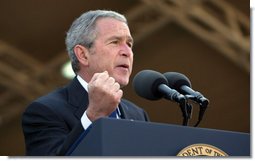 And a lot of people thought that I was going to recommend pulling out, or pulling back. Quite the contrary; I recommended increasing the number of forces so they could get more in the fight, because I believe all along if people are given a chance to live in a free society, they'll do the hard work necessary to live in a free society.
And a lot of people thought that I was going to recommend pulling out, or pulling back. Quite the contrary; I recommended increasing the number of forces so they could get more in the fight, because I believe all along if people are given a chance to live in a free society, they'll do the hard work necessary to live in a free society.
And I understand the fundamental conflict we're in. We're in a conflict between those who want to live in peace and those who murder the innocent to achieve a hateful vision. People say, what are you talking about, hateful vision? Well, I said, all you got to do is look at what life was like if you were a young girl under the Taliban in Afghanistan. These haters have no vision of hope. They want to impose their ideology36 on every man, woman and child in the societies which they feel like they should dominate. Our vision is different, and the vision of most Iraqis is different, and that is, they want to be free; they want to be able to express themselves in a free society. And I believe if given a chance, the ordinary citizen will sacrifice for that vision every time. But they needed the security, they needed the feeling of security in order to do so.
So it's that same principle that's going to guide my decision, and I made it clear to the General that I need to know his considered judgment37 about what it takes to make sure the security gains we have achieved remain in place. And that's what the discussion was about -- besides me thanking him.
We cannot take for granted our troops overseas, and our diplomats overseas. These folks have been gone from their home for a long time, and they miss their families. And so one of the purposes of this trip is to make it abundantly clear to those serving our country that, one, they have earned the respect of the United States of America, and that as the President of a great country, I look forward to telling these great people how much we admire them and appreciate them.
Yes.
Q It sounds like you feel like you're on track for a possible drawdown. Can you say if you feel you're on track from what you heard from General Petraeus?
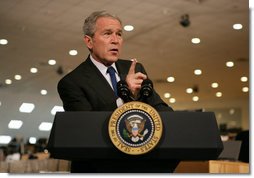 THE PRESIDENT: I think the only thing I can tell you we're on track for is to follow through on that which he recommended last September, and that we'll be on track getting down to 15. And that's what we're on track for. My attitude is, if he didn't want to continue the drawdown, that's fine with me, in order to make sure we succeed, see. I said to the General, if you want to slow her down, fine; it's up to you. And so the only thing I can tell you we're on track for is, we're doing what we said was going to happen. One battalion22 is out, the Marines are out to the extent that we said they were going to come out, and then four more are coming down and be out by July, just like he recommended.
THE PRESIDENT: I think the only thing I can tell you we're on track for is to follow through on that which he recommended last September, and that we'll be on track getting down to 15. And that's what we're on track for. My attitude is, if he didn't want to continue the drawdown, that's fine with me, in order to make sure we succeed, see. I said to the General, if you want to slow her down, fine; it's up to you. And so the only thing I can tell you we're on track for is, we're doing what we said was going to happen. One battalion22 is out, the Marines are out to the extent that we said they were going to come out, and then four more are coming down and be out by July, just like he recommended.
Q What about the political benchmarks? Do those no longer matter?
THE PRESIDENT: Of course they matter. They matter to the Iraqis a lot. It's a sign of reconciliation. I just mentioned they passed a pension law, which, of course, got a huge yawn in our press. But that's -- well, that's okay. (Laughter.) We can't pass -- we can't reform our own pension system, like Social Security, but they did. Is that the only answer? No. They got a lot more work to do, but they're passing law. And they're now in the process of a budget -- getting their budget passed, and a de-Baath law. And we expect them to work hard on the federalism issue. Yes, that's absolutely important, benchmarks.
Q Are they behind where you thought they would be
-- the significant benchmarks?
THE PRESIDENT: Are they behind -- I wouldn't say "significant." I think that's an exaggeration of what I think. I would say that I wish they had passed more law. Of course, in December, I was wishing our legislature had passed more law at times, too. But, no, they've got work to do, no question about it. There are two types of reconciliation: that which can be achieved by passage of national law; and the other kind is the bottom-up reconciliation, where people in neighborhoods are just -- who are sick and tired of criminality and violence, say, look, let's do something about it.
That's -- one of the interesting things, Martha, and you follow this a lot closer than a lot of the other folks have -- not to be blowing your horn or anything but -- these concerned citizen groups -- CLCs; people who have stepped forward and said, we've had enough of this, we're sick and tired of violence. Some 80,000 local citizens who are now helping38 provide local security so their children can have -- grow up in a free society and they can be peaceful. That's what you're seeing. And a part of the Iraqi surge was not only 100,000 additional troops and police, but local citizens coming forward and to -- helping to provide security for their neighborhoods. And that's bottom-up reconciliation.
I'm not making excuses for a government, but to go from a tyranny to a democracy overnight is virtually impossible. And so when you say, am I pleased with the progress -- what they have gone through and where they are today I think is good progress. Have they done enough? No. Are we going to continue to work with them to do more? Absolutely. Absolutely. Our message is very clear: It's in your interest that you pass good law.
And so I'm optimistic they'll get laws passed here pretty quick, and we'll continue to press to make it happen.
Listen, thank you very much. I'm going to speak to the troops, and I'm looking forward to it. Thank you.
END 10:21 A.M. (Local)
 收听单词发音
收听单词发音 
 I really appreciate you all coming over, but more importantly, I appreciate your service to the country.
I really appreciate you all coming over, but more importantly, I appreciate your service to the country.  Iraqis are gradually take [sic] control of their country. Over the past year, Iraqi forces conducted a surge of their own, generating well over 100,000 more Iraqi police and soldiers to sustain the security gains. Tens of thousands of concerned local citizens are protecting their communities, and working with coalition and Iraqi forces to ensure al Qaeda cannot return. The Iraqi government is distributing oil revenues across the country, so that reconstruction can follow hard-won security gains. And from Kirkuk to Ramadi, to Karbala to Bagdad, the people of Iraq -- Sunni, Shia, and Kurd -- are coming together at the grass roots to build a common future.
Iraqis are gradually take [sic] control of their country. Over the past year, Iraqi forces conducted a surge of their own, generating well over 100,000 more Iraqi police and soldiers to sustain the security gains. Tens of thousands of concerned local citizens are protecting their communities, and working with coalition and Iraqi forces to ensure al Qaeda cannot return. The Iraqi government is distributing oil revenues across the country, so that reconstruction can follow hard-won security gains. And from Kirkuk to Ramadi, to Karbala to Bagdad, the people of Iraq -- Sunni, Shia, and Kurd -- are coming together at the grass roots to build a common future.  We cannot take the achievements of 2007 for granted. We must do all we can to ensure that 2008 brings even greater progress for Iraq's young democracy.
We cannot take the achievements of 2007 for granted. We must do all we can to ensure that 2008 brings even greater progress for Iraq's young democracy.  And a lot of people thought that I was going to recommend pulling out, or pulling back. Quite the contrary; I recommended increasing the number of forces so they could get more in the fight, because I believe all along if people are given a chance to live in a free society, they'll do the hard work necessary to live in a free society.
And a lot of people thought that I was going to recommend pulling out, or pulling back. Quite the contrary; I recommended increasing the number of forces so they could get more in the fight, because I believe all along if people are given a chance to live in a free society, they'll do the hard work necessary to live in a free society.  THE PRESIDENT: I think the only thing I can tell you we're on track for is to follow through on that which he recommended last September, and that we'll be on track getting down to 15. And that's what we're on track for. My attitude is, if he didn't want to continue the drawdown, that's fine with me, in order to make sure we succeed, see. I said to the General, if you want to slow her down, fine; it's up to you. And so the only thing I can tell you we're on track for is, we're doing what we said was going to happen. One
THE PRESIDENT: I think the only thing I can tell you we're on track for is to follow through on that which he recommended last September, and that we'll be on track getting down to 15. And that's what we're on track for. My attitude is, if he didn't want to continue the drawdown, that's fine with me, in order to make sure we succeed, see. I said to the General, if you want to slow her down, fine; it's up to you. And so the only thing I can tell you we're on track for is, we're doing what we said was going to happen. One 

